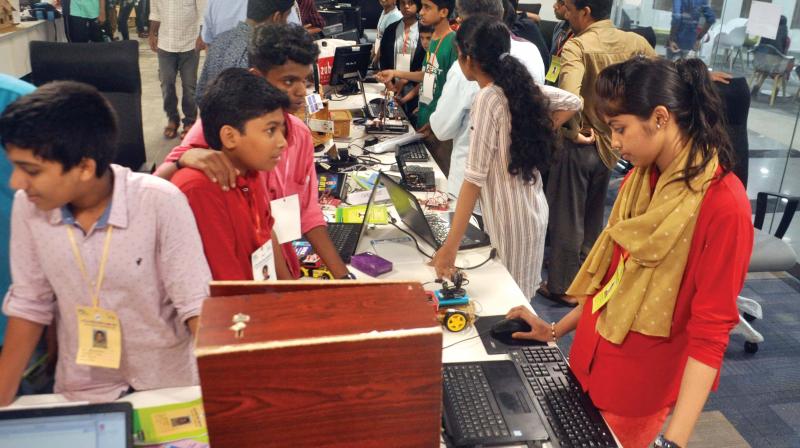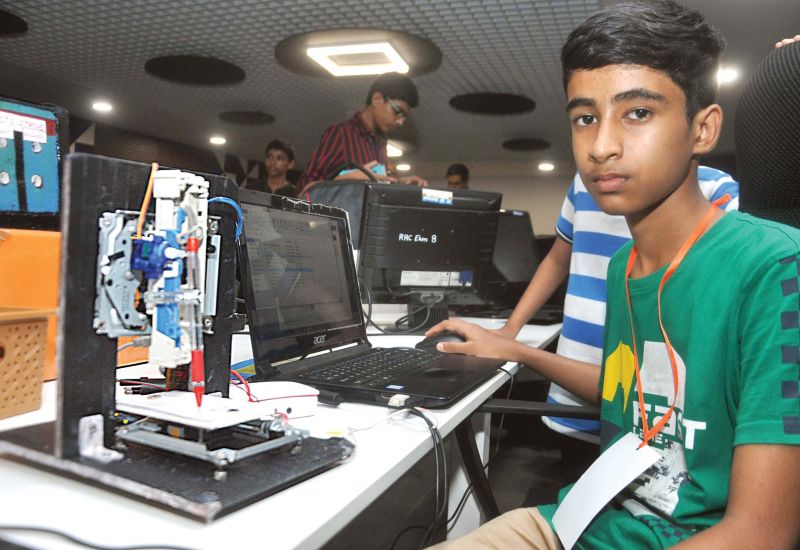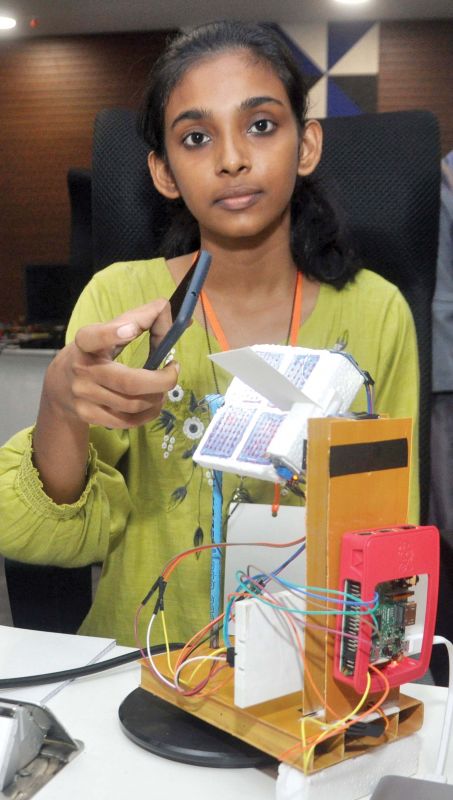Kochi: Taking to the tech world

Kochi: It was a rare meeting for bright little young minds at the start-up complex at Kalamasserry in the second week of August aimed at unleashing their entrepreneurial and innovative potential and to learn and equip themselves for bigger achievements in future. The 231 Class X students drawn from state schools from across the state after a two-level screening turned the start-up eco-system into their playground for two days exploring the tech world and churning out possibilities which could amaze the grownups, including their trainers.
The students were brought to the startup complex by KITE (Kerala Infrastructure and Technology for Education) under the department of education which gave the young ones a Rapsberry Pi each and some training in robotics and animation while asking them to play with each to improvise and innovate with their own ideas. And the efforts were worth it.
The innovative ideas and products they came up with included an automatic street light system created by Nandana Biju of St Augustine GHSS, Ernakulam. It has inbuilt sensors which controlled the operation of lighting in tune with the existing lighting and climate.
Afnan Yousuf of GBHSS Manjeri displayed the 'Smart Shelf' with advanced security features with connectivity through GPS to a mobile phone or computer. It sends alerts via SMS if the shelf falls or is beaten hard in bid to open. It works even if unplugged from an AC power source. The door will not lock unless completely closed. It has a smart mirror with voice enabled Alexa/Google assistant and has voice assistant.
The Smart Eco Waste Box created by P.A. Amjad, a Std X student of VHMSS of Moyoor in Malappuram district, was another highlight at the exhibition hall of the workshop. The box would automatically open on detection of a human nearby by way of ultrasonic sensors. The timing of the opening lid can be set in advance and would close automatically after 3-5 seconds. Another innovation presented by was a smart agriculture field by Mubeen Ahmed, AMHS, Tirurkad, Malappuram. The field detects moisture level, humidity, temperature and then sends a message in the phone to which it is electronically linked to. Alerts will be sent to phone if interference from animals and birds is detected. The water supplying pump and fans in the cattle shed can be operated from the mobile.
"The camp very well demonstrated the tremendous potential of our budding techies," said K. Anvar Sadath, vice-chairman and executive director, KITE. "KITE will provide opportunity for all the 1.5 lakhs + members of Little KITEs to watch the sessions through KITE VICTERS subsequently. Children were keen to demonstrate their products without competition. These modules and feed backs will be adopted for the Little KITEs training in all schools next year."
 Muhammed Hudaif of Markaz HSS, Karanthur, with his line plotter.
Muhammed Hudaif of Markaz HSS, Karanthur, with his line plotter.
Little KITEs units have been established in the state schools as part of the hi-tech school project implemented as part of the Public Education Rejuvenation Mission of the State Government.
It was after an elaborate process that KITE picked up the students for the state-level camp. It conducted a sub-district level camp across the state in which 13,404 students participated. The 1143 students selected from them participated in district level 'Little KITEs' camp; the 231 finalists were selected based on their improvised and innovative technical output.
The 'Little KITEs' were exposed to areas such as artificial intelligence, virtual reality, augmented reality, robotics, 3D character designing, animation pre-production and post-production and drawing at the first ever two-day workshop in the state.
 T. Devananda of CKGMHS, Chingapuram, with her smart solar harvest system.
T. Devananda of CKGMHS, Chingapuram, with her smart solar harvest system.
The camp also featured interactive sessions by eminent personalities, classes on specific topics, an exhibition of electronic and robotic projects and 3D animations created by students themselves and even an industrial visit to the startup firms operating in the startup complex premises.
General education minister Prof C. Raveendranath was the first one to get impressed by the electronic and robotic products made and exhibited by the students at a hall on the complex premises. He declared at the event that the project would be taken to the higher secondary level also.
Muralee Thumma-rukudy, chief of disaster risk reduction in the UN Environment Programme in his interaction asked students to don the role of leaders and take up responsibility. "Nowadays it is the older generation who are the decision makers, which is not the need of the hour. It has to be the younger generation which has to take up that role - a model which is successful in most developed nations," said Mr Thummarukudy.
"In our nation, the political decisions are often taken by people who are in their 60s or 70s. But in comparison, it is the young leaders who make a difference in this role in most of the developed nations. If we have to achieve a better future, we need to have young blood. They are keen in politics and democracy with an eye for detail and a larger vision for society's well-being," he said.
Experts' classes on artificial intelligence, augmented reality and virtual reality were lapped up by the young ones with great zest and attention. But the Little KITEs champions were more passionate in visiting some of the start-up firms operating from the Startup Mission center, controlled by their bigger brethren.
The Maker Village and fab lab set-up within the Startup Mission premises all were thrown open to them to see and to get inspired for bigger and higher things. Dr. Achuth Sankar S. Nair, head- department of computational biology and bioinformatics, University of Kerala, was among the experts who interacted with them on the first day.
Classes on drawing and 3D designing by experts on the second day took the students to another creative realm. Cartoonist E. Suresh Kumar took a class on drawing igniting the creative minds of students. This was followed by an expert class on 3D designing by K.S. Madhu, CEO of Hibiscus Digital Media, who propelled the creativity of students on the digital platform. In a parallel session, C.K. Shaji, a master trainer of KITE and an expert in programming, took a detailed class on programming for those Little KITEs who were focused on that area.
The final session of the camp was an expert class on robotics by ASIMOV Robotics and Robo inventions, in which the students were thrilled to see the 'live' SAYA Robot created by the firm. It was the first of its kind experience for the students to 'interact' with SAYA, an entry level humanoid robot. In the end smiling faces returned with a resolve to crack something new in the world of technology.

